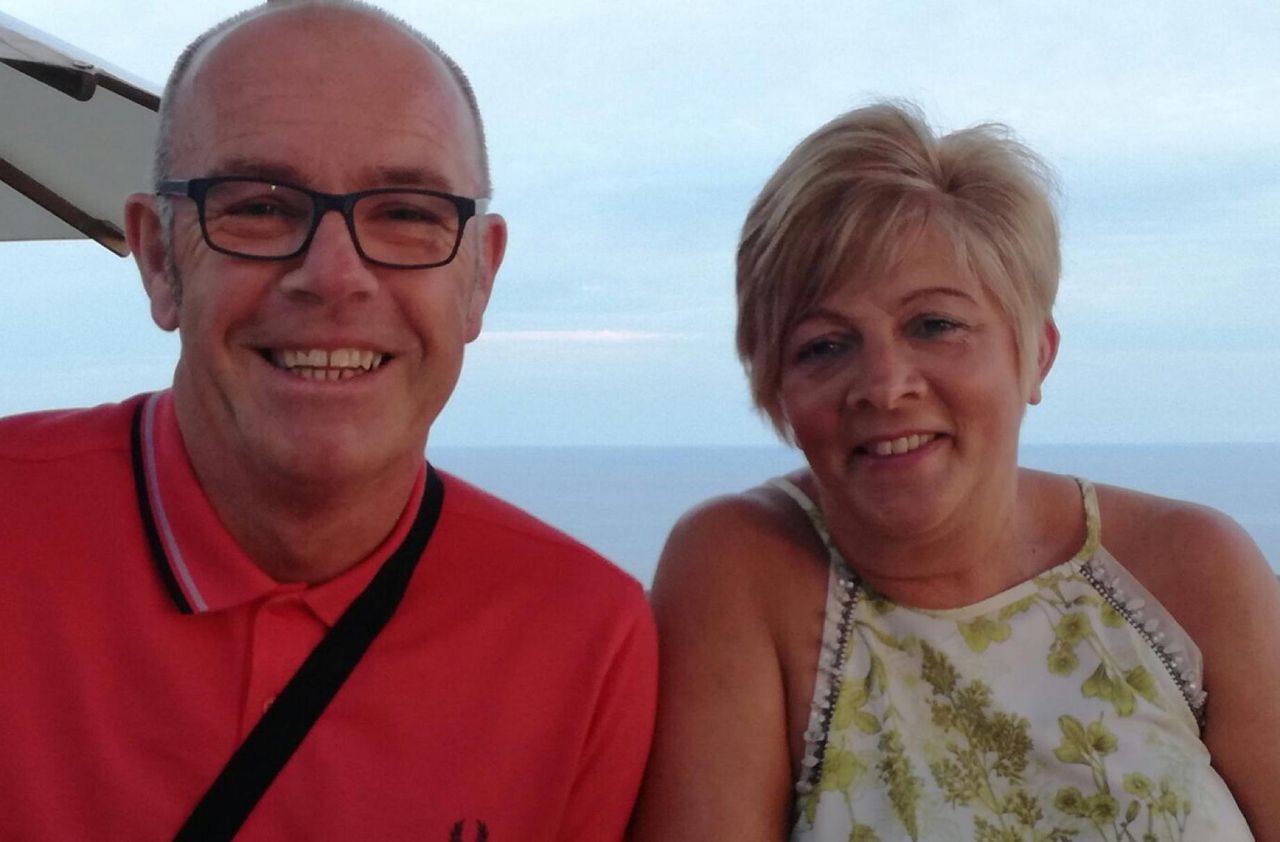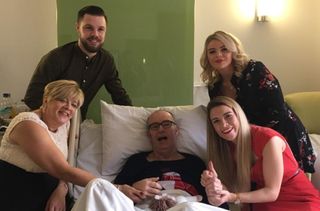'I didn't want him to worry' Brave women reveals why she chose not to tell her husband he was dying

When Debbie Kiely said her wedding vows, she never dreamed she would lose her husband before they reached retirement age. But when Michael was diagnosed with a terminal illness in 2018, she was told he only had a few months to live. Making a difficult decision, she chose not to tell him he didn't have long left. Here, she explains why...
Kissing my new husband as our horse-drawn carriage pulled away from the church, blissful happiness washed over me. It was June 1986 and Michael and I had just promised to love each other for the rest of our lives. ‘Even when I’m old and wrinkly?’ Michael, then 24, joked as we waved to our guests. ‘Of course,’ I beamed.
Michael was tall and handsome, we’d met on a night out in Birmingham six years earlier. After our wedding, we moved into our own little place and in May 1988, our son, Jason, came along. Michael was delighted to have a mini-me. ‘He’s my little champ,’ he’d laugh. Our daughter, Hannah, was born in 1990, followed by Stacey, in 1992, and Michael treated his girls like princesses.
Michael and I worked hard, him at a power plant and me as a hairstylist, to make sure the kids had everything they wanted. Life was stressful, but we were a team. Once the kids moved out, we were looking forward to retiring so we could do a bit of travelling. But in 2013, my mum was diagnosed with dementia and our plans were put on hold while we helped organise her care.
Still, we had time to celebrate our 30th wedding anniversary with a garden party in June 2016, and the following May our daughter, Hannah, then 27, got engaged. Michael was so proud and was looking forward to the big day, set for June 2019.
But as the months went by, Michael began to display strange behaviour. He became withdrawn and tired, often forgetting why he’d walked into a room. I put it down to his stressful job, but by the beginning of 2017, he began to distance himself from friends. ‘I just can’t be bothered to talk to them,’ he said when I questioned him. I was worried, but I tried not to think about it too much. I was busy with work, too, and we were getting older.
In July 2017, we wanted to downsize and so moved into a bungalow. After we’d spent days unpacking, Michael turned to me with a perplexed look on his face, ‘When are we going home then?’ he asked. Confused, I told him this was our home and told him to get some rest, assuming he was tired. But he could never remember where the bathroom was, or even the front door.
GoodtoKnow Newsletter
Parenting advice, hot topics, best buys and family finance tips delivered straight to your inbox.
Days later, I booked an appointment with a doctor and as a precaution, Michael was sent for brain scans. I tried not to worry, but two weeks later, we were referred to a neurologist. Even in this time, Michael had become more distant and never seemed to take in a word I was saying, like he was in a daze.
‘I believe Michael is suffering from sporadic Creutzfeldt-Jakob disease (CJD),’ the neurologist said at the appointment. I recognised the name CJD from the news – but Michael couldn’t have ‘mad cow disease’, surely?
‘There are four different types of CJD. Sporadic CJD is the human form, caused by random mutations of genes and is nothing to do with affected meat,’ the consultant explained, ‘A lumbar puncture to test his spinal fluid will confirm it.’ Michael, distracted by something on the wall, wasn’t even listening.
I sobbed as the doctor explained that there was no treatment. Sporadic CJD patients suffer personality changes, including loss of intellect and memory as their brain shuts down, causing their organs to fail. Michael had just months to live, yet he hadn’t taken any of it in.
Back home, as Michael watched TV, I broke the news to the kids, in the kitchen. We wept and hugged for nearly an hour. ‘Does Dad understand?’ Hannah asked. ‘No, and I don’t think we should tell him,’ I said, ‘I don’t want him to worry.’
We vowed to carry on as normal for as long as we could, making sure Michael was comfortable and happy. Days later, the doctor phoned to tell me the lumbar puncture had come back positive for sporadic CJD. I just felt numb.
Over the next few weeks, Michael’s behaviour became manic. Full of nervous energy, he’d run out the house with the dogs or pull all of his tools out, all over the drive. He couldn’t remember our names either – calling the kids ‘babas’ and me ‘mama’.
In October, Hannah organised a special fitting at the shop she’d bought her wedding dress from. ‘Beautiful girl, have you had a good party?’ Michael asked, clearly confused. He didn’t understand, but it was a lovely moment and very important to Hannah. By the end of November, Michael became incontinent and could no longer walk. Our doctor suggested he go into palliative care, and after discussing it with the kids, I agreed.

On 3 December, I drove Michael to a Marie Curie hospice. He seemed happy enough and kissed me goodbye. ‘It feels as though we’ve already lost him,’ I said to Hannah over the phone. That night, I cried myself to sleep.
The kids and I visited every day and he always smiled and waved as we came in. The medical staff began to administer morphine, but slowly, his body shut down.
By Christmas Day, he couldn’t eat or speak. We took him presents and he smiled as we played games. On New Year’s Eve, we had a Chinese takeaway around his bedside while he slipped in and out of sleep. The following morning, when nurses called to say he didn’t have long left, the kids and I slept by his side for two days, taking it in turns to hold his hand and tell him we loved him.
And on 3 January, Michael slipped away. He was only 55; he didn’t deserve to go so young, when we all needed him still. It didn’t feel fair. Our only comfort was that he died painlessly and quickly, while he was still able to smile. Thankfully, blood tests proved that it wasn’t genetic, so the kids weren’t in any danger. Michael just had terrible bad luck.
A few days later, my mum passed away, too, at the age of 86. Life felt overwhelming for a while, but after a few months, I went back to work, which helped. Between my family and lovely clients, I never felt alone as I grieved.
In June 2019, I walked Hannah down the aisle and gave a speech. I just hope I did Michael proud. Family events without Michael will always be tinged with sadness, but he wouldn’t want us to wallow. Michael loved life and would have done anything for his family, so we try to carry on and make the most of it all, for him. This year, I’ll turn 60, a milestone he didn’t get to see.
I may not have got to love him until we were old and wrinkly, but I couldn’t have asked for a better husband.
How can you help? Please support Marie Curie care for people at this unprecedented time of need and donate to the urgent appeal today.